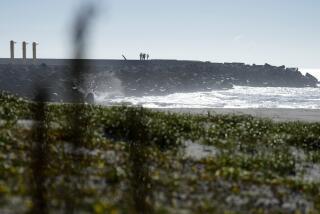Smoke plumes set back Japan’s efforts to contain nuclear crisis
- Share via
Reporting from Tokyo, Los Angeles and Senmaya, — Japan’s battle to control the damaged nuclear power plant in Fukushima suffered a setback Monday after plumes of smoke rising from two of the six reactor buildings forced an evacuation of repair crews and stalled operations to restore vital cooling systems.
It was unclear early Tuesday what had had produced the smoke, which came from the structures housing reactors No. 2 and 3. But some Japanese scientists said the problems didn’t appear to signal a deteriorating situation at Fukushima, where workers had been making progress in the painstaking work to contain the nuclear crisis.
Still, the unexplained black and gray plume, and a temporary increase in radiation levels around the plant on Monday, underscored the still precarious scene at the Fukushima Daiichi nuclear facility, where the March 11 Tohoku earthquake and tsunami knocked out the plant’s outside power and emergency cooling systems, causing a leak of radiation from multiple sources.
The interruption delayed by a day efforts to restore power to the cooling systems at the plant. The smoke also caused fire officials to halt the spraying of water onto the reactors.
The snag came on a day when the executive director of the U.S. Nuclear Regulatory Commission, Bill Borchardt, said that the agency’s staff in Japan reported that the three reactors probably had suffered core damage but did not appear to be leaking significant amounts of radiation.
“I say optimistically that things appear to be on the verge of stabilizing,” Borchardt said.
In Japan and abroad, however, concerns over radiation fallout grew. On Monday, Japanese officials said they detected higher than normal radiation levels in samples of seawater around the power complex. And residents of at least one village near the nuclear plant were ordered not to drink tap water.
Japanese authorities Monday also ordered farmers in Fukushima prefecture to halt shipments of milk. And three other nearby prefectures, along with Fukushima, were told to stop shipping spinach and some other vegetables after traces of the radioactive isotopes Iodine 131 and Cesium 137 were found in batches from regions surrounding the plant.
World health officials warned of potential dangers posed by the tainted food. In a sign of the potential problem for Japan’s food exports and international image, one Japanese restaurant in Taiwan was reportedly providing radiation gauges with its meals.
World Health Organization officials advised people living near the plant who may have consumed tainted produce or animal products to seek medical attention.
Neighboring nations have increased scrutiny of produce coming from Japan. The governments of China, South Korea and the Philippines have ordered screening of imports from Japan for radiation contamination.
Many Japanese in the tsunami zone, meanwhile, were still experiencing acute shortages of food and gasoline, which caused long lines and shorter tempers.
Many restaurants in the northeastern portion of the country were printing abbreviated menus of five or six dishes. Convenience stores were running out of food and at several locations lines stretched around the block with people seeking such staples as water and rice.
But perhaps the lingering gasoline shortage presented the toughest challenge on Day 10 of the multi-fronted disaster, a situation that many older residents said harked back to the days of deprivation after World War II.
Most gas stations around the region remained closed. Those still open drew lines that left people waiting 12 hours or more, and then only to fill a portion of their tanks.
In the city of Senmaya, about 200 miles north of Tokyo, Sumie Sato and her husband, Naohiro, both 26, slept in their subcompact overnight to receive about five gallons of precious gasoline.
“We have a 2-month-old son at home, so we can’t take any chances,” said Sumie. “My son has been sick, so if he gets really bad we’ll need gas to take him to the hospital.”
Lee reported from Tokyo and Kim from Los Angeles. Glionna reported from Senmaya. Times staff writer Thomas H. Maugh II in Los Angeles contributed to this report.
More to Read
Sign up for Essential California
The most important California stories and recommendations in your inbox every morning.
You may occasionally receive promotional content from the Los Angeles Times.













